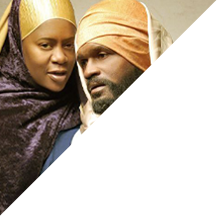
hether it is dogmatic, or an errant interpretation and internalization of a spiritual practice or norm, toxic “faith” emanates from a variety of sources. Rogue religion, and spurious spirituality, having multiplied through the ages are still virulent today. We can trace the resultant strains of mutated faith back to the ancient text.

Annanias and Sapphira (Acts 4:32-5:11) sold some property as part of an early church drive to fund the ministry and support the community of believers. Many believers did the same, bringing all the proceeds to the apostles, church, and community. What a selfless and progressive organization, right? Except for Annanias and Sapphira. When they separately arrived to report to the leaders that they were surrendering all, they concealed the fact that they withheld some; they lied to the community; they lied to the Spirit, and suffered sudden death because of it. People were terrified. So great was the bond among early members then, that the early terminology evinces their offense akin to embezzlement. They held back, when others were giving with abandon. They had every right not to give, not to surrender all the proceeds, not to participate in that way, but they chose, in the moment, to lie about their commitment.
This was an early, memorable, and deadly rebuke against the fake religious experience. It reverberates among each community leader who is self-dealing, while professing to be down with the cause. Pretending to be in the Spirit, yet, calculating the “show” for human eyes. What would one’s God experience become if we operated in transparency and truth?

Cain offers God what he wants to offer, in the Genesis account (Genesis 4:3-16). He brings the offering of his choice, and a sacrifice that he determines worthy. God doesn’t like it and doesn’t accept it. Rather than owning his choice, and God’s response, Cain then broils in a fretful stew as the blessings, favor and acceptance come to Abel for his obedience. Unable to manage his own resentment, Cain commits the first murder in history by killing his own brother.
“To obey is better than sacrifice, and to hearken [listen] better than the fat of lambs,” Samuel reminded Israel’s King Saul, (1 Samuel 15:22). Yet, consciously reinterpreting God’s word for your convenience, is the opposite of a healthy, helpful, faith experience. It’s also strangely toxic, as this combination in the Bible resulted in a treacherous profile for both Cain and Saul. Wondering why someone wants to stab you in the back as you walk your walk?


Ahab took the idea of following your heart to his own detriment. We often remind the kids not to run with the wrong crowd, but Ahab, as an adult, chose a woman diametrically opposed to his faith and his God. The simple choice was far from being a “light thing,” according to 1 Kings 16:31. He took the whole country down with him.

Jesus told this parable, which seemed to push the bounds of that which is true-to-life, too embarrassingly self-righteous to be true: “Two men went up into the temple to pray; the one a Pharisee, and the other a publican. The Pharisee stood and prayed thus with himself, God, I thank thee, that I am not as other men are, extortioners, unjust, adulterers, or even as this publican. I fast twice in the week, I give tithes of all that I possess,” (Luke 18:10-12).
Yet, Jesus has His finger on the pulse of His people, and knows that in our moments self- reflection, we tend toward the disastrous distraction of comparison. Self-assessment is good; self-righteousness, not so much. Comparison is death to our spiritual focus, foolishly trusts ourselves with an accurate spiritual self-evaluation, and uses the wrong “scale,” currency, and metric. Better off pleading the fifth, and asking for mercy, Jesus says. “I tell you, this sinner, not the Pharisee, returned home justified before God. For those who exalt themselves will be humbled, and those who humble themselves will be exalted” (v. 14).

“There was a certain rich man, which was clothed in purple and fine linen, and fared sumptuously every day . . . And there was a certain beggar named Lazarus, which was laid at his gate, full of sores . . . “But Abraham said to him, ‘Son, remember that during your lifetime you had everything you wanted, and Lazarus had nothing. So now he is here being comforted, and you are in anguish” (Luke 16:19-31).
What kind of faith allows one to step around, step over, walk past the suffering, daily, without making the personal attempt to change the circumstances, or change the societal structure that causes the suffering? A toxic religion, that’s what kind. The people around us know who we profess to be, and know what they should expect from us. To them, it looks like toxic faith.

James and John, aka, “The Sons of Thunder” wondered if when people treated Jesus with a cold shoulder, whether they should call down fire upon those who dared to disrespect and offend them, (Luke 9:53-55). Later, their mother was seen and heard asking if Jesus would grant them exclusive appointments as His right and left hand men. Herein is a hallmark of toxic religious practices: a willingness, an eagerness to obliterate one’s enemy in the face of conflict, differences, over tradition, custom, power, or compliance. There’s also the idea that the “inner circle” is marked by privilege, that the favored ones judge over the others. Jesus told them, you don’t know what kind of spirit you are of, implying, certainly, that it sure wasn’t the Holy Spirit.

Peter, the apostle, in a moment of weakness, retreated into his own way of doing things by snubbing new Gentile, uncircumcised believers, and secretly refusing to eat with them—as was the old, customary way Gentiles were treated under Jewish law. He had to know that God was not a respecter of person. Nevertheless he bent to the biases of the group, disgraced his faith, and misrepresented the teachings of Scripture in the process. Then as now, secret bias works insidiously behind the scenes. Watch how quickly that spread: “As a result, other Jewish believers followed Peter’s hypocrisy, and even Barnabas was led astray by their hypocrisy,” (see the whole story in Galatians 2:11-14).

People of Corinth didn’t even seem to notice that a man in the church was sleeping with his father’s wife. Nobody called a flag on the play. Nobody acknowledged what everybody suspected or knew. Toxicity spreads quickly in the trusted environments where consensual, but not godly, and nonconsensual and ungodly sexual interactions occur, and no one says anything.
The scriptures are clear: call it out before it hurts everybody. “Your glorying is not good,” Paul wrote in a letter to that church. “Know ye not that a little leaven leaveneth the whole lump?
Purge out therefore the old leaven, that ye may be a new lump, as ye are unleavened. For even Christ our passover is sacrificed for us,” (1 Corinthians 5:6-7), and for #metoo.

Another problem in Corinth plagues the “faithful” today, and that was a tendency to identify with, claim, and follow the favored preacher and teacher of the day, just as we do the gurus, and the influential now. Crestfallen because your pastor was on the news? Dejected because a mistress derailed someone’s ministry? Did someone catch them live, in an embarrassing profanity-laced streak? The good news is, he or she is not your savior, but the imperfect human messenger. Team Preacher/Teacher can be problematic because of its inherent turf conflict among the hearts of the people, their resulting focus on the teachers, and less on their own development and agency within the Spirit, and, the distraction away from God in His glory. He sent the messengers of grace in the first place! (1 Corinthians 3:4-6).

Many can identify with the frustratingly, long journey Israel took to their Promised Land. Angry and discouraged because of the way God is leading your life, through some hills and valleys you don’t particularly appreciate? It seems as though it would be better, in our view, if we could go it alone, take another path. Mad at God. Mad at leaders.
Not everyone can relate to the idea of a “fiery serpent” (Numbers 21:6)—the results of our decisions, the results of our ingratitude, the results of our complaints—that come back to bite us. If you’ve traded in your love for lust, your health for a hit, your life for what you thought was a sure thing, you know about the sting in your back side.
Yet, the inexplicable mercy of God takes the very thing He hates—that bite of death—and nails it. “Look at it,” He said. “It can’t hurt you anymore. Live.” As stuck as you and I are in the mess of our own making, it’s because of His word, His promise, and His mercy that we can live.
“And as Moses lifted up the serpent in the wilderness, even so must the Son of man be lifted up: That whosoever believeth in him should not perish, but have eternal life. For God so loved the world, that he gave his only begotten Son, that whosoever believeth in him should not perish, but have everlasting life,” (John 3:14-16).